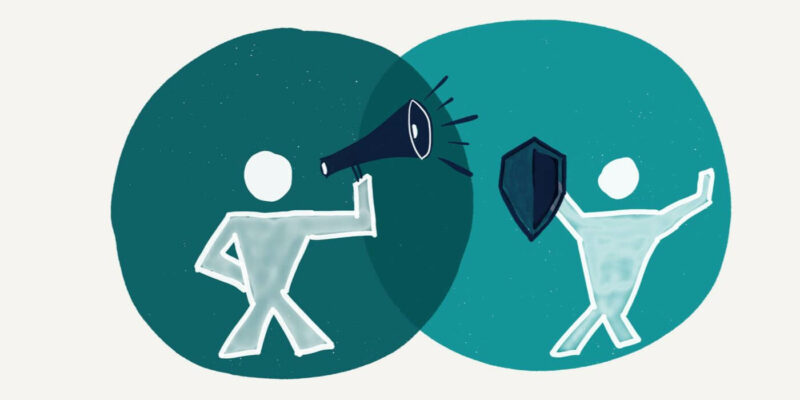Mental toughness means you’re able to resits the pull of unhelpful thoughts and emotions and keep your behavior aligned with your goals and values.
For example:
- You feel yourself starting to worry and are able to redirect your attention onto the presentation you’re giving.
- You want to lash out and say something sarcastic after your spouse criticizes you, but you resist that impulse, and instead, consider their criticism objectively.
- You feel ashamed about skipping your last personal training, but you show up to the gym on Monday afternoon despite those feelings.
Unfortunately, we often sabotage our ability to be mentally tough when we give in to bad habits. For example: It’s hard to be mentally tough in the face of social anxiety when you’re in the habit of immediately criticizing yourself anytime you feel anxious.
So, if you want to become more mentally tough, work to identify and eliminate the four habits that get in the way.
1. Getting lost in your own thoughts
When it comes to thinking, mentally tough people know that often less is more.
Our abilities to think, reason, problem-solve, and plan are all incredibly powerful and frequently beneficial. But they can also be double-edged swords when used inappropriately.
But how could problem-solving or planning be inappropriate? Aren’t those always good ideas?
It’s easy to see it that way, but consider the following:
- Is worrying about your daughter while she’s out on her first date actually helpful? Does it really solve any problems or help you achieve anything meaningful?
- Does dwelling on past mistakes in your marriage and running through all the different alternatives you could have made helpful to your marriage now? Maybe doing it once or twice helped you learn a thing or two, but if you’ve been ruminating on it for years and years, it’s hard to see the benefit.
There’s always an emotional cost to negative thinking like worry and rumination. So if you’re going to do it, you better have clear benefits to outweigh the costs.
The trouble is most of us assume instinctively that all thinking is good and useful.
But it should be pretty obvious with the above examples that that’s definitely not always the case. And in fact, too much unhelpful thinking can be the source of profound emotional suffering.
So why do we do it? Why do we continue to worry or dwell on things and get lost in our thoughts even if it’s not helpful?
Here’s the key insight about unhelpful thinking:
Even if negative thinking isn’t actually helpful, it often feels helpful in the moment.
If you’re in a position where you feel helpless or out of control, for example, sometimes you’ll do anything to feel just a little more in control. Including trying to “problem-solve” something you know can’t be solved.
This is how people get addicted to mental habits like worry and rumination. The little hit of control keeps them coming back for more—even as the emotional side effects like chronic anxiety and depression explode out of control.
Thinking is a tool. And like any tool, it can be used well or poorly.
Learn to set better boundaries with your thoughts, and you’ll find yourself far less likely to get lost in them.
2. Using punishment to motivate yourself
It never ceases to amaze me how hard people are on themselves:
- The instant they make a mistake, they’re telling themselves what an idiot they are in their head.
- The second they start to feel sad, they berate themselves for being weak and soft.
- At the slightest hint of rejection or criticism, they’re meticulous in pointing out how worthless they are as people.
It’s utterly baffling how cruel we are to ourselves.
Isn’t it strange that you can be wonderfully compassionate and understanding with your friends when they make mistakes or feel bad, but the minute you screw up, you start assaulting yourself with negative self-talk and self-judgment?
This used to baffle me a lot more until I reflected on how most people are raised…
One very strong theme in almost everyone’s childhood is that they were taught that you need to be hard on yourself in order to be successful. That if you’re gentle or easy on yourself, you’ll end up as some kind of a degenerate slacker.
Combine that with the fact that our culture already influences people to tie their self-worth to external measures of success, and it’s not so surprising that we have a world full of self-loathing inner jerks.
Of course, it’s all a big lie. Being hard on yourself doesn’t actually lead to anything positive. In fact, it typically makes you weaker.
Suppose you flub the final slide of your presentation at work. Does beating yourself up with tons of criticism and self-judgment increase or decrease your odds of making a good impression during your lunch with the boss in an hour?
Kicking yourself when you’re down is just a recipe for staying down even longer.
Mentally strong people understand that we’re all resilient by nature. And that the best way to be mentally tough is to be gentle with yourself when things are tough.
With a little practice, you’ll find that self-compassion is far more motivating and effective than self-judgment.
3. Prioritizing outcomes over growth
Be careful of tying your identity to your results in life.
The most unhappy people I’ve ever met seem to share a common trait: They’re obsessed with outcomes…
- They’re obsessed with getting perfect grades and being at the top of their class.
- They’re obsessed with having perfect kids, in a perfect house, in the right neighborhood, and working at the right company.
- They’re even obsessed with outcomes in their personal growth: They have to be happier, more confident, and free from bad moods. And now!
Now you might be thinking to yourself:
But isn’t it good to strive for good outcomes and set goals and work hard to achieve them?
Sure, but here’s the thing:
People who build their identity solely on results become emotionally fragile.
And the reason is simple: You can’t control results…
- No matter how long you study, your professor could always throw in some curveballs that bumps your grade down to an A-.
- No matter how many long hours you put in at the firm, the owner could always decide to make his son-in-law partner instead of you.
- No matter how many self-help articles and personal growth books you read, you can’t avoid feeling sad, anxious, or unhappy sometimes.
Your self-worth will inevitably suffer when you hand over control of your identity to external circumstances.
Instead, mentally strong and resilient people base their identity on effort and inputs:
- They judge themselves based on how well they prepared for the test, not the letter grade at the end.
- They assess their abilities in terms of how they perform, not what other people think.
- They see progress as a journey of continual small steps and refinements, not as a black or white answer.
When you stop obsessing over outcomes and results, you free yourself up to engage with life from a place of curiosity and genuine engagement.
Not only will this make you happier and more mentally tough, but ironically, it’s a better way to achieve results as well.
4. Not making time to be alone
For many people, the biggest obstacle to happiness and success in life is themselves.
Whether you’re trying to stick to a new diet, ace an upcoming job interview, or be a better partner or parent, often the biggest obstacle will be your own thoughts, beliefs, feelings and behaviors—in other words, your own psychology.
For example:
- When you give in and binge on dessert instead of sticking to your diet, it’s probably not because you haven’t read enough diet books or didn’t truly want to lose weight.
- Instead, it’s far more likely that you saw a dessert, which triggered thoughts about how delicious it would be, which triggered a craving, which led to cognitive tunnel vision such that all you could think about was that Devil’s Food Cake staring at you all evening.
- Of course, you probably didn’t know all that was going on in the moment—that your mind was being hijacked because you don’t understand your moods and emotions very well. And consequently, you have a hard time working with them when they don’t align with your long-term values (like weight loss).
So, what exactly does this have to do with making time to be alone?
In order to work with your mind instead of being sabotaged by it, you have to understand it. But here’s the thing:
You’ll never understand your mind if you don’t make time for it.
It’s a lot like friendships… How many good friends would you have if you never made quality time to hang out with them and get to know each other?
Mental toughness comes from understanding how your thoughts and emotions work, so you can train them to work for you instead of fighting against them.
The best way to get to know your own mind is to make time to be alone with it.
Luckily, there are many, many ways to do this:
- Meditation
- Contemplative prayer
- Journalling
- Weekly reviews
- Even something as simple as carving out 20 or 30 minutes per day to go on a quiet walk or have coffee on the porch without a phone or newspaper.
If you never allow yourself to be alone with your own mind, you’ll often find yourself fighting with or running away from difficult feelings and moods instead of engaging with them. Which is a shame since…
All the best things in life are on the other side of difficult emotions.
- Make some time to be alone with your thoughts and feelings, get to know them a little, and you’ll eventually discover an ally, not an enemy.
All You Need to Know
If you want to be more mentally tough, focus on eliminating these bad habits:
- Getting lost in your own thoughts
- Using punishment to motivate yourself
- Prioritizing outcomes over growth
- Not making time to be alone
Want to Work with Me to Build Mental Toughness?
A couple times a year, I guide a small group of motivated individuals through a six-week program to build emotional strength and resilience. It’s called Mood Mastery and you can learn more about it here →





9 Comments
Add YoursThank you for this article. I enjoyed the read and found it very reassuring.
You are my number one go-to source for sound mental health advice. I’m 75 with a solid psychology background. You advocate for us using leading psychological science and intuitive, loving articles. Thank you.
Nick, An excellent article. Thanks for sharing this and for the great work you do, and the generous help you provide so many. I hope to find ways to support your endeavors in some form going forward.
Best wishes,
Shankar.
Nick, An excellent article. Thanks for sharing this and for the great work you do, and the generous help you provide so many. I hope to find ways to support your endeavors in some form going forward.
Best wishes,
Shankar.
Nice article Nick. I find it especially important to learn to be aware and comfortable with yourself. Meditation, music, reading, good diet, and exercise help keep me grounded and healthy.
Thank you for an excellent article with perfect examples and solutions that are simple and doable !
No magic, just compassionate self acceptance and wiling to try again!
I am had been practicing positive psychology for many years and find your writings very useful and uplifting! Thank you Nick!!!
What you describe is exactly what I am going through at present. It was great to learn that I am on the right track by taking a moment to understand my thoughts better before simply reacting to them. Its opened up a whole new dimension in terms of my potential to handle stressful situations in life, so much better.
A huge thank you for adding to the light.
Excellent article. Your article is extremely lucid and really helps one going forward rather then backward Thank you so much for been a great guide
Hi Nick,
I really appreciated reading your article. I agree that these are for key areas of thought that — if challenged — can keep us from falling into anxiety or depressive disorders.
As I read through your article I thought of the emphasis in Positive Psychology of stating goals in the positive rather than the negative. I wonder if you would agree with the positive restatements I have attended to make regarding the 4 ‘no go’ statements you have put forth?
Mentally Tough People:
– Redirect their thoughts when they notice that they’ve become anxious, obsessive or filled with worry
– Use rewards (not punishments) to motivate themselves
– Prioritize their personal growth over outcomes
– Make time to be alone in their own thoughts to get back in touch with what’s important to them
Thoughts?